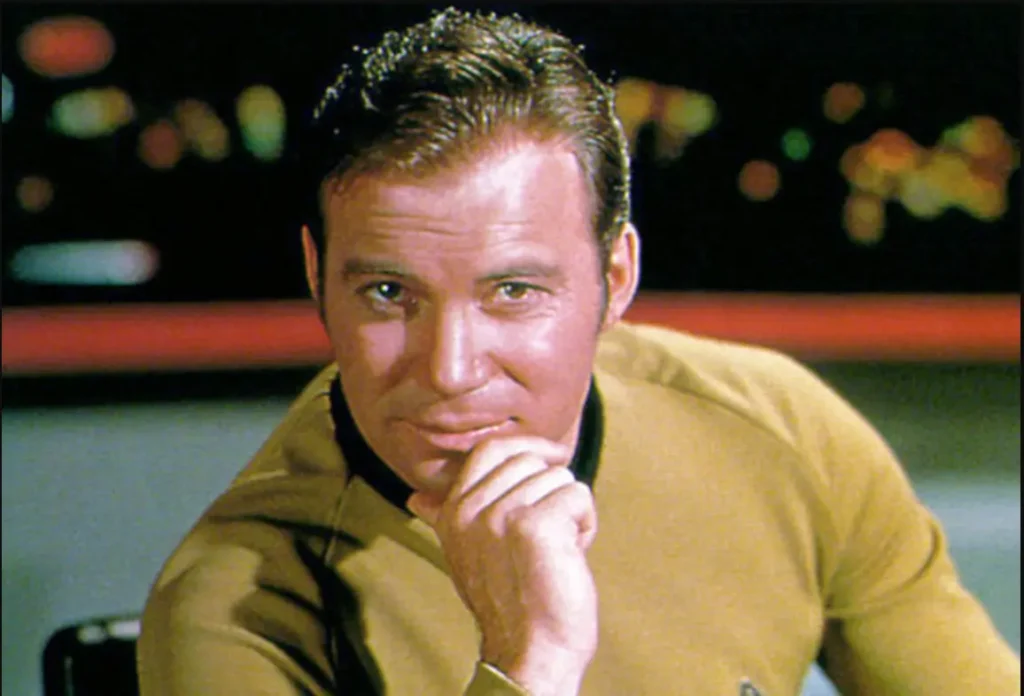
Captain Kirk, the legendary commander of the USS Enterprise from Star Trek’s original series, embodies one of science fiction’s most inspiring examples of bold leadership, moral courage, and the unwavering belief that humanity can overcome any challenge through determination, compassion, and innovative thinking. His approach to command—balancing logic with intuition, diplomacy with decisive action, and respect for protocol with the courage to break rules when necessary—has made him an enduring symbol of principled leadership and the pioneering spirit. These Captain Kirk affirmations draw inspiration from his fearless exploration of the unknown, his commitment to protecting his crew and upholding Federation values, and his demonstration that true leadership means taking responsibility for difficult decisions while never losing faith in the potential for peaceful solutions.
The timeless appeal of Captain Kirk lies in his embodiment of the ideal that leadership is not about rank or authority, but about the willingness to stand up for what is right, protect those under your care, and face impossible odds with confidence and creativity. His command style combines military discipline with humanitarian values, showing that strength and compassion are not opposing forces but complementary aspects of effective leadership. Through his adventures across the galaxy, Kirk demonstrates that the greatest explorations are not just of outer space but of the human spirit and our capacity for growth, understanding, and connection with others.
These Captain Kirk affirmations will help you cultivate the same bold confidence, moral clarity, and leadership excellence that made this starship captain such an inspiring figure:
• Embrace bold leadership and take decisive action even in uncertain situations, trusting your judgment and experience to guide you toward the right choice • Stand firm in your moral convictions while remaining open to new perspectives and diplomatic solutions that serve the greater good • Protect and support your team members with unwavering loyalty, understanding that a leader’s first responsibility is to those who serve under their command • Face unknown challenges with confidence and curiosity rather than fear, viewing each obstacle as an opportunity for growth and discovery • Balance logic and emotion in decision-making, using both analytical thinking and intuitive wisdom to find optimal solutions • Take personal responsibility for the consequences of your leadership decisions, never passing blame to others or avoiding accountability • Pursue peaceful resolutions whenever possible while maintaining the strength and resolve necessary to defend your principles when diplomacy fails • Inspire others through your own example of courage, integrity, and dedication to higher ideals and humanitarian values • Never give up hope or surrender in the face of seemingly impossible odds, believing that creative solutions and determined effort can overcome any challenge
Whether you’re in a position of formal leadership, seeking to develop your own command presence, or simply striving to live with greater confidence and moral courage, these Captain Kirk affirmations will remind you of the extraordinary impact that comes from combining bold action with compassionate values and unwavering commitment to doing what is right.
25 Best Captain Kirk Affirmations
- Like Captain Kirk, I lead with confidence and decisive action, trusting my judgment even in uncertain situations.
- I stand firm in my moral convictions while remaining open to diplomatic solutions that serve the greater good.
- My loyalty to my team is unwavering, and I protect and support those who serve under my leadership.
- I face unknown challenges with curiosity and courage, viewing obstacles as opportunities for growth and discovery.
- Like Captain Kirk, I balance logic and emotion in my decision-making, using both analytical thinking and intuitive wisdom.
- I take full responsibility for the consequences of my leadership decisions, never avoiding accountability or passing blame to others.
- My pursuit of peaceful resolutions is matched by my readiness to defend my principles when diplomacy fails.
- I inspire others through my example of courage, integrity, and dedication to humanitarian values and higher ideals.
- Like Captain Kirk, I never surrender in the face of impossible odds, believing that determination can overcome any challenge.
- I explore new frontiers with boldness and optimism, pushing boundaries while respecting the rights and dignity of all beings.
- My command presence combines strength with compassion, showing that true leadership serves others rather than dominating them.
- I make difficult decisions quickly when necessary, understanding that hesitation in critical moments can cost lives and opportunities.
- Like Captain Kirk, I value diversity and different perspectives, knowing that strength comes from unity rather than conformity.
- I maintain hope and faith in humanity’s potential for growth, even when confronted with evidence of our flaws and limitations.
- My communication is clear and direct, ensuring that my team understands both the mission objectives and the values we uphold.
- I adapt my leadership style to meet the needs of each situation, being flexible while maintaining consistent core principles.
- Like Captain Kirk, I believe that rules and regulations serve important purposes but should never override moral imperatives or humanitarian concerns.
- I approach first contact and new relationships with respect, curiosity, and the assumption of good faith whenever possible.
- My personal relationships with team members strengthen rather than compromise my ability to lead effectively and make tough decisions.
- I use creative problem-solving and unconventional thinking to find solutions that others might overlook or dismiss as impossible.
- Like Captain Kirk, I understand that being a leader means sometimes standing alone for what is right, even when it’s unpopular.
- I maintain physical and mental readiness for the challenges of leadership, keeping myself prepared for whatever situations may arise.
- My respect for protocol is balanced by my willingness to improvise when circumstances demand innovative approaches to complex problems.
- I build trust through consistent actions and transparent communication, creating an environment where my team can perform at their best.
- Like Captain Kirk, I know that the greatest adventures and discoveries come from boldly going where no one has gone before, both externally and within ourselves.
Captain Kirk: Inspirational Quotes
The commanding voice and philosophical insights of Captain Kirk resonate throughout Star Trek’s original series, offering timeless wisdom about leadership, exploration, human nature, and the pursuit of peace through strength and understanding. These carefully selected quotes capture his approach to command, his faith in humanity’s potential, and his belief that boldness and compassion can coexist in effective leadership. Each quote reflects his unique ability to balance military discipline with humanitarian values while inspiring others to reach beyond their limitations.
- “Risk is our business. That’s what this starship is all about. That’s why we’re aboard her.”
- “I don’t believe in the no-win scenario.”
- “Genius doesn’t work on an assembly line basis. You can’t simply say, ‘Today I will be brilliant.'”
- “We’re human beings with the blood of a million savage years on our hands, but we can stop it. We can admit that we’re killers, but we’re not going to kill today.”
- “Logic is the beginning of wisdom, not the end.”
- “I need my pain. It makes me who I am.”
- “Freedom is never a gift. It has to be earned.”
- “Without followers, evil cannot spread.”
- “A starship captain’s most solemn oath is that he will give his life, even his entire crew, rather than violate the Prime Directive.”
- “Conquest is easy. Control is not.”
- “There are always alternatives.”
- “I’ve already got a female to worry about. Her name is the Enterprise.”
- “Power corrupts. Absolute power corrupts absolutely.”
- “In every revolution, there’s one man with a vision.”
- “Death, when unnecessary, is a tragic waste.”
- “A little suffering is good for the soul.”
- “We’re not going to kill today!”
- “Spock, you want to know something? Everybody’s human.”
- “I’ve found that evil usually triumphs unless good is very, very careful.”
- “No one can guarantee the actions of another.”
- “Change is the essential process of all existence.”
- “Infinite diversity in infinite combinations.”
- “The prejudices people feel about each other disappear when they get to know each other.”
- “I’m not a magician, Spock. Just an old country doctor.”
- “To boldly go where no man has gone before.”
History of Captain Kirk
Captain James Tiberius Kirk emerged from the creative vision of Gene Roddenberry as the central character of Star Trek, first appearing in the original series pilot “The Cage” (though played by Jeffrey Hunter as Captain Pike), before being reimagined and brought to life by William Shatner in the series that premiered in 1966. Created during the height of the 1960s space race and civil rights movement, Kirk was conceived as an idealized version of American leadership—confident, moral, and progressive—who would command humanity’s first deep space exploration vessel in the 23rd century.
The character’s development reflected Roddenberry’s vision of an optimistic future where humanity had overcome its divisions and prejudices to become part of a peaceful galactic federation. Kirk represents the best aspects of human nature: courage in the face of danger, compassion for all forms of life, and the wisdom to know when rules must be broken to serve higher moral principles. His background as a farm boy from Iowa who rose through Starfleet ranks through merit and dedication embodies the American dream translated to a spacefaring civilization.
Kirk’s command of the USS Enterprise NCC-1701 during its historic five-year mission established many of the conventions that would define Star Trek’s approach to science fiction storytelling. His leadership style, which balanced military protocol with humanitarian concerns, created a template for how future captains would approach the challenges of deep space exploration. The character’s relationships with his crew, particularly his friendship with Science Officer Spock and Chief Medical Officer McCoy, demonstrated that effective leadership requires both professional competence and personal connection.
Throughout the original series, Kirk’s character grappled with the fundamental challenges of command: the weight of responsibility for his crew’s lives, the loneliness of leadership, and the difficulty of making moral decisions in complex situations. His adherence to Starfleet’s Prime Directive—the non-interference principle governing contact with developing civilizations—often created dramatic tension as he struggled to balance non-interference with his moral obligation to help those in need.
The character’s development across the original series, animated series, and subsequent films showed his evolution from an ambitious young captain to a seasoned explorer who had seen the best and worst of the galaxy. His encounters with alien civilizations, his battles against tyranny and oppression, and his unwavering commitment to peaceful exploration over military conquest established him as one of science fiction’s most enduring symbols of enlightened leadership and human potential.
Kirk’s influence extends beyond entertainment to real-world discussions about leadership, diplomacy, and space exploration. His character has been cited by military leaders, business executives, and political figures as an example of principled leadership that combines decisiveness with moral clarity. The character’s famous commitment to “boldly go where no man has gone before” has become synonymous with the spirit of exploration and discovery that drives human advancement.
Who and When Made Captain Kirk
Captain Kirk was created by Gene Roddenberry, an American television producer and writer born in El Paso, Texas, in 1921, who developed the character as part of his groundbreaking science fiction series Star Trek. Roddenberry, a former World War II bomber pilot and Los Angeles police officer, drew from his military and law enforcement experience to create a character who embodied the qualities he believed were essential for effective leadership: moral courage, tactical intelligence, and genuine concern for those under his command.
The development of Captain Kirk began in the early 1960s when Roddenberry was working to sell his Star Trek concept to television networks. Initially, the character was conceived as Captain Robert April, then evolved into Captain Christopher Pike (played by Jeffrey Hunter in the original pilot), before finally becoming James T. Kirk when William Shatner was cast for the second pilot “Where No Man Has Gone Before” in 1965. The character’s final form was shaped by Shatner’s own interpretation and acting style, which brought a unique combination of intensity, charisma, and vulnerability to the role.
Star Trek premiered on NBC on September 8, 1966, with Kirk at the center of stories that tackled contemporary social issues through the lens of science fiction. The series ran for three seasons until 1969, with Kirk appearing in all 79 original episodes. Despite its initial cancellation, the show found new life in syndication and eventually led to a series of successful motion pictures beginning with “Star Trek: The Motion Picture” in 1979, with Shatner reprising his role as Kirk.
The intellectual property surrounding Captain Kirk has expanded significantly since the original series, encompassing six original cast films, numerous novels, comics, games, and other media. The character has appeared in various forms across the Star Trek universe, including alternate timeline versions in the recent reboot films where he is portrayed by Chris Pine. The rights to Star Trek and Captain Kirk are currently owned by Paramount Pictures, following various corporate acquisitions and mergers over the decades.
Kirk’s cultural impact extends far beyond science fiction, with the character becoming a symbol of American leadership ideals and the pioneering spirit. William Shatner’s portrayal established many of the mannerisms and characteristics that have become iconic, including his distinctive speaking style, his approach to action scenes, and his chemistry with fellow cast members Leonard Nimoy (Spock) and DeForest Kelley (McCoy).
The character has influenced countless other science fiction protagonists and has been the subject of extensive academic analysis examining his role as a representation of 1960s American values, leadership philosophy, and cultural attitudes toward exploration and diplomacy. Kirk’s approach to command has been studied in business schools and military academies as an example of effective leadership under pressure.
The enduring popularity of Captain Kirk has been demonstrated through continued merchandise sales, fan conventions, and the character’s presence in popular culture references and parodies. His famous phrases, particularly “Beam me up, Scotty” (though this exact phrase was never actually spoken in the original series), have entered common usage as cultural shorthand for technological advancement and futuristic thinking.
The character’s influence on space exploration has been acknowledged by NASA and other space agencies, with real-world astronauts and space program leaders citing Kirk as an inspiration for their careers. The optimistic vision of the future presented through Kirk’s adventures has contributed to public support for space exploration and scientific advancement.
Roddenberry’s creation of Captain Kirk as a moral leader who uses diplomacy before force, respects diversity, and maintains hope in humanity’s potential for progress has provided a template for aspirational leadership that continues to resonate with new generations of viewers and has influenced discussions about ethics, diversity, and the responsible use of power in both fictional and real-world contexts.
Why We Love Captain Kirk
Our enduring love for Captain Kirk stems from his embodiment of the ideal leader who combines decisive action with moral integrity, never losing sight of the humanity and dignity of those he encounters, whether they be crew members or alien civilizations. He represents the hope that authority can be exercised with both strength and compassion, showing us that true leadership means protecting others and standing up for principles even when it requires personal sacrifice. His willingness to break rules when they conflict with higher moral imperatives demonstrates that the best leaders serve justice rather than mere protocol.
Kirk appeals to audiences because he makes bold leadership seem both attainable and admirable, showing that confidence and humility can coexist in the same person. His relationships with his crew demonstrate that effective leadership builds on trust, loyalty, and genuine care for others’ wellbeing. He proves that vulnerability and strength are not opposites but complementary aspects of authentic leadership that inspire others to exceed their own limitations.
Perhaps most importantly, Captain Kirk represents the optimistic belief that humanity can overcome its flaws and divisions to achieve greatness through exploration, understanding, and cooperation. His adventures show us that the universe is full of wonders worth discovering and that our differences make us stronger rather than weaker. He reminds us that the greatest frontiers are not just in outer space but in our capacity for growth, empathy, and the courage to do what is right even when it is difficult.
His lasting popularity reflects our deep need for leaders who embody both competence and character, showing us that it is possible to be both strong and kind, both decisive and thoughtful.
Interesting Facts about Captain Kirk
- Full Name: Captain James Tiberius Kirk’s middle name was revealed in Star Trek: The Animated Series and later confirmed in the films.
- William Shatner’s Age: Shatner was 35 years old when he first played Kirk, making him relatively young for such an authoritative role.
- Iowa Origins: Kirk was born in Riverside, Iowa, on March 22, 2233, according to Star Trek canon.
- Youngest Captain: Kirk became one of the youngest starship captains in Starfleet history when he took command of the Enterprise.
- Chris Pine Reboot: The 2009 Star Trek reboot featured Chris Pine as a younger Kirk in an alternate timeline.
- Command Colors: Kirk’s gold command uniform established the color coding system used throughout Star Trek for command officers.
- Kobayashi Maru: Kirk is famous for being the only cadet to beat the no-win Kobayashi Maru simulation by reprogramming it.
- Three Seasons: The original series ran for only three seasons (1966-1969) but Kirk appeared in all 79 episodes.
- Six Films: William Shatner played Kirk in six Star Trek films from 1979 to 1994.
- Death and Return: Kirk died in “Star Trek Generations” (1994) but the character continued in alternate timelines and prequels.
- Shatner’s Improvisation: Many of Kirk’s mannerisms and speaking patterns were William Shatner’s own contributions to the character.
- Cultural Icon: Kirk has been referenced and parodied countless times in popular culture, making him recognizable even to non-Star Trek fans.
- NASA Recognition: NASA has acknowledged Kirk’s influence on space exploration and public interest in the space program.
- Academy Award: The original Star Trek series never won major awards, but the films featuring Kirk received Oscar nominations.
- Merchandise Success: Captain Kirk has been one of the most successful Star Trek characters in terms of merchandise and licensing deals.








